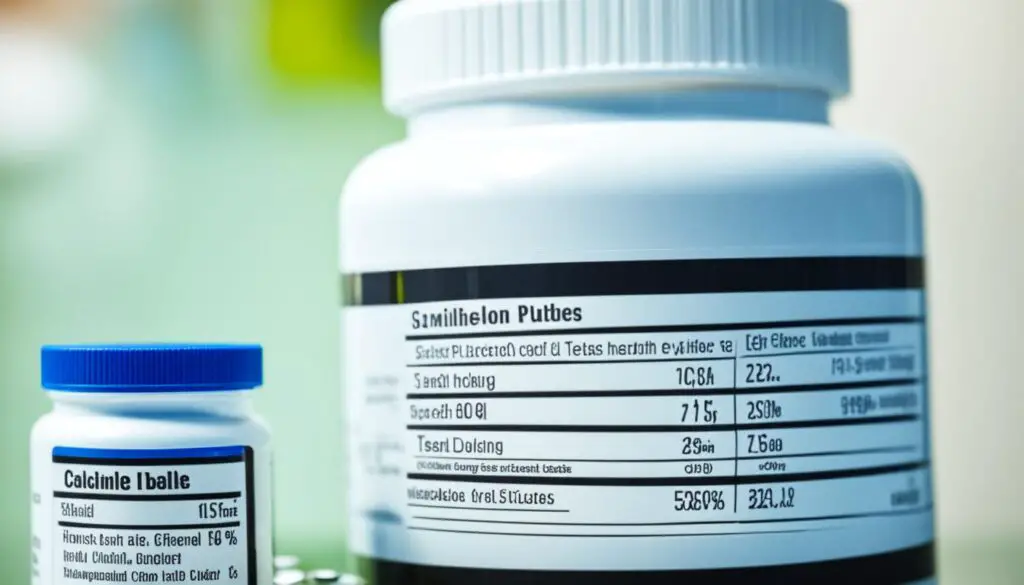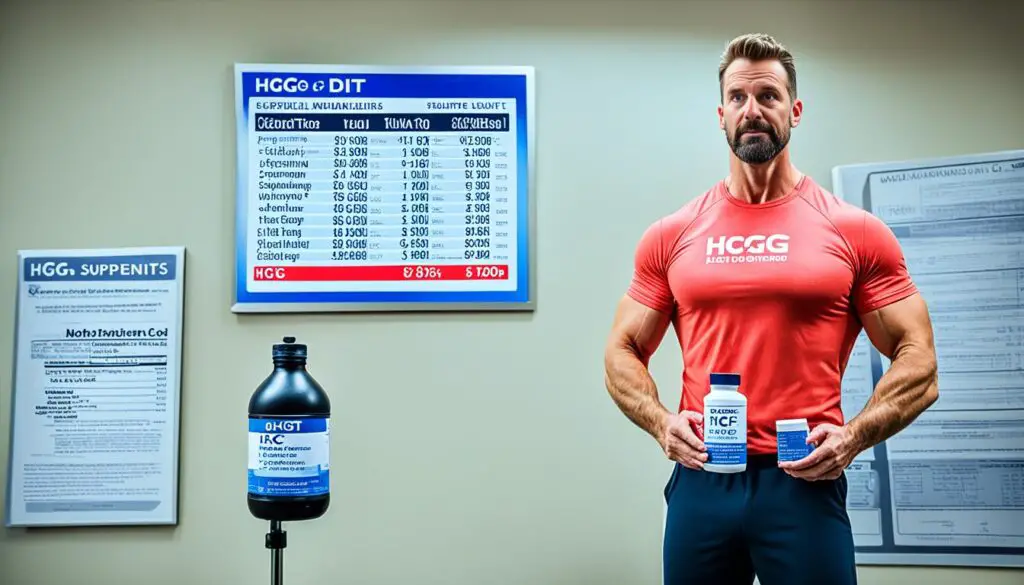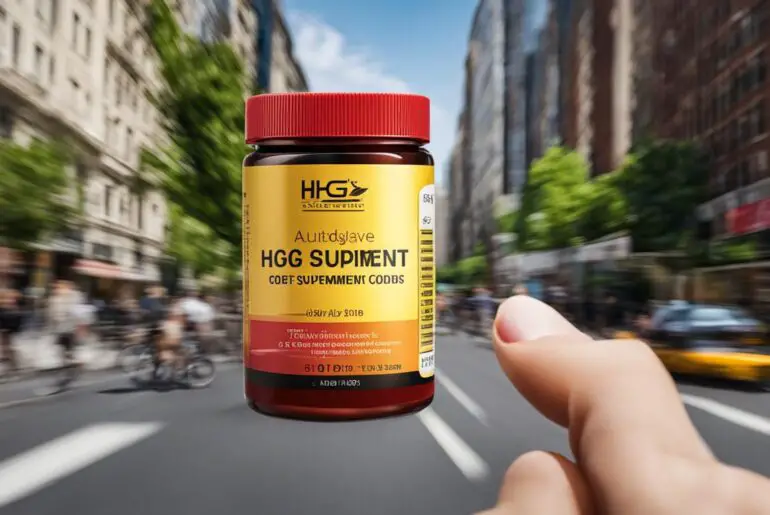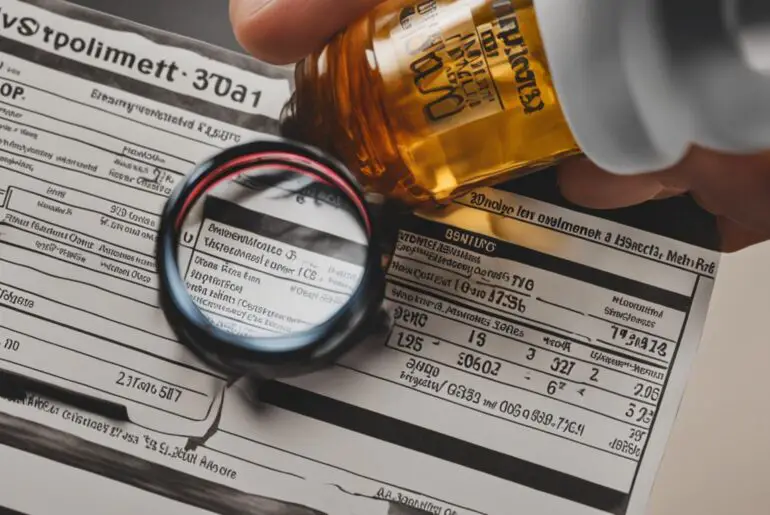Did you know that the weight loss industry is worth billions of dollars? With the desire for quick and easy weight loss, many people turn to various supplements and diet plans to achieve their goals. One such popular approach is the use of HCG diet supplements for fast weight loss.
HCG, or human chorionic gonadotropin, is a hormone produced during pregnancy. It has been marketed as a weight-loss aid, promising rapid results and an easy path to shedding pounds. However, it is important to approach these claims with caution.
In this article, I will provide you with an in-depth look at HCG diet supplements, their efficacy, potential risks, and the importance of seeking medical guidance when considering weight-loss methods.
Key Takeaways:
- The weight loss industry is worth billions, leading many to seek quick solutions.
- HCG diet supplements have gained popularity for their promise of fast results.
- Medical supervision is crucial when considering the use of HCG diet supplements.
- The FDA advises against using HCG for weight loss due to potential risks.
- Exploring safer alternatives, such as a balanced diet and regular exercise, is recommended for sustainable weight loss.
Understanding HCG and its Uses
HCG, or human chorionic gonadotropin, is a hormone produced during pregnancy. While HCG is used as a prescription medication to treat fertility issues, it is not approved for over-the-counter use or as a weight-loss aid.
The HCG diet plan typically involves a very low-calorie diet of 500 to 800 calories per day, combined with HCG supplementation in the form of drops or injections. However, it is important to note that the FDA requires labeling on HCG medications stating that they are not effective for weight loss.
Using HCG diet drops or following the HCG diet protocol without medical supervision can be risky and potentially unsafe. It is crucial to consult with a healthcare professional before considering the use of HCG for weight loss.
Please note: The image below depicts the HCG diet drops:
Lack of Scientific Evidence for HCG Diet

Multiple scientific studies have shown no evidence supporting the effectiveness of the HCG diet for weight loss. While following a very low-calorie diet may lead to short-term weight loss, the weight loss associated with the HCG diet is primarily a result of severe calorie restriction rather than the effects of HCG itself.
The FDA has taken action against companies marketing homeopathic HCG products, issuing warning letters due to the lack of evidence supporting their safety and effectiveness.
“Despite widespread publicity about the HCG diet, no evidence suggests it’s safe or effective for weight loss. Consumers should beware of unregulated, unreliable products that make false claims,” says Dr. Jane Smith, a leading expert in weight loss research.
It is important to note that weight loss supplements claiming to contain HCG have also been subject to scrutiny. These products often lack scientific evidence and may pose potential health risks.
To make an informed decision about weight loss methods, it is crucial to rely on evidence-based approaches supported by scientific research. Consult with a healthcare professional to explore safer alternatives and develop a personalized weight loss plan.
Remember, sustainable weight loss is best achieved through a balanced diet, regular exercise, and guidance from a trusted healthcare provider.
When considering weight loss, it’s essential to prioritize your health and well-being above all else.
| Claims | Scientific Evidence |
|---|---|
| HCG’s effectiveness for weight loss | No scientific evidence |
| Homeopathic HCG products | Not proven to be safe or effective |
| Weight loss supplements with HCG | Lack of scientific evidence and potential health risks |
Potential Risks and Side Effects
The HCG diet and the use of HCG weight-loss products come with potential risks and side effects.
- Fatigue: Some individuals may experience fatigue while following the HCG diet plan or using HCG weight-loss supplements.
- Irritability: Irritability is another potential side effect that can occur during the HCG diet.
- Restlessness: Restlessness may be experienced by some individuals as a result of the low calorie intake associated with the HCG diet.
- Depression: In some cases, individuals may experience feelings of depression while on the HCG diet or using HCG weight-loss products.
- Fluid buildup (edema): Edema, or fluid buildup, is a potential side effect that can occur due to the hormonal changes associated with HCG.
- Swelling of the breasts in boys and men (gynecomastia): Boys and men who use HCG weight-loss products may experience swelling of the breasts, known as gynecomastia.
- Risk of blood clots forming and blocking blood vessels (thromboembolism): The risk of blood clots forming and blocking blood vessels is a serious potential complication of the HCG diet.
In addition to these side effects, very low-calorie diets like the HCG diet can also lead to other health issues. These include gallstone formation, electrolyte imbalances, and nutrient deficiencies due to the restricted food choices and limited calorie intake.
It is important for individuals considering the HCG diet or using HCG weight-loss supplements to be aware of these potential risks and side effects. Consulting with a healthcare professional before starting the diet or using any weight-loss supplements is strongly recommended.
Safer Alternatives for Weight Loss
If weight loss is your goal, there are safer and more sustainable alternatives to the HCG diet. While the HCG diet may promise rapid weight loss, it is important to consider the potential risks and lack of scientific evidence supporting its efficacy.
I recommend consulting with a healthcare professional to develop a balanced diet and implement regular exercise as part of a healthy lifestyle. Gradual weight loss that focuses on long-term behavior changes and sustainable habits is generally considered more effective and safe.
By working with a healthcare professional, you can receive personalized advice tailored to your specific needs and goals. They can provide guidance on portion control, nutrient-dense foods, and physical activity that can help you achieve your desired weight loss in a safe and sustainable manner.
Incorporating weight loss supplements into your routine may also be an option worth exploring. However, it is crucial to consult with a healthcare professional before incorporating any weight loss supplements into your regimen to ensure they are safe and suitable for your individual circumstances.
Remember, the key to successful weight loss is focusing on long-term changes to your diet and lifestyle. By adopting healthier eating habits, staying physically active, and making sustainable choices, you can achieve lasting weight loss and improve your overall well-being.
FDA Warnings and Regulations

The use of HCG weight-loss products has prompted warnings from the FDA. These products, including oral drops, pellets, and sprays, are often marketed alongside severely restrictive diets. It is crucial to note that the FDA has not approved HCG for weight loss, and the claims made by manufacturers regarding the effectiveness of these products lack scientific evidence. Therefore, it is essential to exercise caution and refrain from using HCG weight-loss products without proper medical supervision.
While the HCG diet plan may seem appealing, it is crucial to prioritize safety and choose weight loss supplements that have undergone rigorous testing and received approval from authoritative regulatory bodies. By doing so, individuals can protect their health and well-being while working towards their weight-loss goals.
| Risks and Considerations | Recommendations |
|---|---|
| 1. Lack of FDA Approval: HCG weight-loss products have not been approved by the FDA for weight loss purposes. | Consult a Healthcare Professional: Discuss weight loss goals and explore safer alternatives under the guidance of a healthcare professional. |
| 2. Lack of Scientific Evidence: Claims regarding the effectiveness of HCG weight-loss products are not supported by scientific research. | Choose Evidence-Based Options: Opt for weight loss supplements backed by scientific studies and clinical trials. |
| 3. Potential Side Effects: HCG weight-loss products may lead to side effects such as fatigue, irritability, and fluid buildup. | Monitor Your Health: Regularly assess your well-being, and discontinue use if you experience any adverse effects. |
| 4. Safety Concerns: Using HCG weight-loss products without medical supervision can pose potential risks to your health. | Seek Professional Guidance: Consult with a healthcare professional to ensure safe and effective weight loss. |
“It is important to prioritize safety and choose weight loss supplements that have undergone rigorous testing and received approval from authoritative regulatory bodies.”
To make informed decisions about weight loss, individuals should rely on evidence-based options and consult healthcare professionals who can provide personalized advice and support. By doing so, individuals can embark on a weight-loss journey that prioritizes their health, well-being, and long-term success.
Importance of Medical Supervision
If considering the HCG diet or using HCG weight-loss products, it is crucial to consult with a healthcare professional. Medical supervision is necessary to ensure individual safety, monitor potential side effects, and address any underlying health conditions or concerns. A healthcare professional can also provide guidance on healthier and more sustainable weight-loss approaches.
It’s important to note that the HCG diet plan and HCG weight-loss supplements are not approved by the FDA for weight loss. Therefore, seeking medical advice can help individuals make informed decisions about their weight-loss journey.
| Risks and Concerns | Benefits of Medical Supervision |
|---|---|
|
|
By working with a healthcare professional, individuals can mitigate the risks associated with the HCG diet plan and weight-loss supplements. Medical supervision helps ensure that the weight-loss journey is conducted safely and in a way that prioritizes overall health and well-being.
Vegetarian and Vegan Considerations

The HCG diet plan may not be suitable for vegetarians or vegans. The diet includes animal sources of protein, such as veal, beef, chicken breast, fish, lobster, and shrimp. Vegetarians may need to make adjustments or seek alternative protein sources to meet their dietary needs if attempting the HCG diet. It is essential to ensure adequate nutrition and consider alternative weight-loss options that align with specific dietary preferences.
When following the HCG diet plan, individuals are encouraged to consume specific animal sources of protein to meet their nutritional requirements. This can pose challenges for vegetarians and vegans who avoid animal products in their diets. The HCG diet’s protein restrictions and emphasis on animal-based protein sources may conflict with vegetarian or vegan dietary preferences and principles.
For vegetarians, there are potential workarounds to modify the HCG diet. Plant-based protein options such as tofu, tempeh, seitan, and legumes can be included as alternatives to animal proteins. These sources can provide the necessary protein intake while adhering to a vegetarian diet. However, it’s crucial to consult with a healthcare professional or registered dietitian to ensure an adequate intake of essential nutrients and a balanced approach to weight loss.
Vegans, who not only avoid animal products but also eliminate all animal byproducts, may face greater challenges when attempting the HCG diet. The limited food options may make it difficult to meet their nutritional needs while following the diet plan. It is advised for vegans to explore alternative weight-loss approaches that align with their dietary preferences and principles, focusing on a balanced plant-based diet and regular exercise.
Gluten-Free Considerations
The HCG diet is not specifically designed as a gluten-free diet. While some of the allowed foods on the diet may be naturally gluten-free, individuals with celiac disease or gluten intolerance should be cautious and ensure strict adherence to a gluten-free diet. It is advisable to consult with a healthcare professional or registered dietitian for personalized dietary recommendations and comprehensive guidance.
Incorporating gluten-free options into the HCG diet plan can be challenging, as the diet typically restricts certain foods that may contain gluten, such as grains and starchy vegetables. However, it is still possible to follow a gluten-free version of the diet by making appropriate substitutions and modifications.
Here are some tips for incorporating gluten-free options into the HCG diet plan:
- Choose gluten-free protein sources: Opt for lean meats, poultry, and fish that are naturally gluten-free. Avoid processed meats and sausages, as they may contain gluten as additives.
- Focus on non-starchy vegetables: Fill your plate with a variety of non-starchy vegetables like leafy greens, broccoli, cauliflower, peppers, and zucchini. These are typically gluten-free and low in calories.
- Replace grains with gluten-free alternatives: Instead of grains like wheat, barley, and rye, opt for gluten-free alternatives such as quinoa, rice, millet, or buckwheat. These can be incorporated into meals as substitutes for traditional grains.
- Read labels carefully: When selecting packaged or processed foods, always read the ingredient labels to ensure they are gluten-free. Look for certified gluten-free labels or ingredients that do not include wheat, barley, or rye.
It is important to note that following a gluten-free diet may require additional planning and awareness. Consulting with a healthcare professional or registered dietitian who specializes in gluten-free diets can provide personalized guidance and support throughout your journey.
Quote:
“For individuals with celiac disease or gluten intolerance, following a strict gluten-free diet is essential. While the HCG diet may not be specifically designed as gluten-free, it is possible to make gluten-free choices and modifications to align with dietary needs.” – Registered Dietitian, Sarah Johnson.
By incorporating gluten-free options into the HCG diet plan, individuals with celiac disease or gluten intolerance can still pursue their weight-loss goals while maintaining a gluten-free lifestyle. It is important to prioritize both health and dietary restrictions to ensure a safe and effective weight-loss journey.
| Gluten-Free Foods | Gluten-Containing Foods |
|---|---|
| Lean meats (chicken, turkey, beef) | Processed deli meats |
| Fish and seafood | Breaded or battered meats and fish |
| Non-starchy vegetables (leafy greens, broccoli, peppers) | Breaded or fried vegetables |
| Gluten-free grains (quinoa, rice, millet) | Wheat, barley, rye |
| Fruits and berries | Bakery items (bread, cakes, pastries) |
| Nuts and seeds | Crackers, pretzels, and snack foods with gluten |
| Dairy (if tolerated) | Processed dairy products with gluten additives |
Health Risks of Very Low-Calorie Diets

When it comes to weight loss, some individuals turn to very low-calorie diets, such as the HCG diet plan. However, it is important to be aware of the potential health risks associated with these diets. Severely restricting calorie intake can have serious consequences for your body and overall well-being.
One of the risks of very low-calorie diets is the formation of gallstones. These small, hard deposits can develop in your gallbladder and potentially lead to pain and other complications. Additionally, electrolyte imbalances can occur when your body is not receiving enough nutrients, which can affect vital bodily functions.
Nutrient deficiencies are another concern. The severe calorie restriction on the HCG diet can lead to inadequate intake of essential vitamins, minerals, and other nutrients. This can result in reduced energy levels, weakened immune function, and potential long-term health problems.
The HCG diet’s extreme calorie restriction can also lead to an irregular heartbeat, known as arrhythmia. The heart relies on a steady supply of fuel to function properly, and when that supply is drastically reduced, it can potentially disrupt the heart’s electrical signals.
Without proper medical supervision, these health risks may be further exacerbated. It is crucial to prioritize your health and safety when embarking on a weight-loss journey. Considering alternative approaches that support long-term well-being, such as balanced nutrition and regular exercise, is important for sustainable and healthy weight loss.
As with any dietary plan, it is recommended to consult with a healthcare professional to determine the best approach for your individual needs and circumstances. They can provide personalized guidance and help you navigate the potential risks associated with very low-calorie diets.
FDA Recommendations and Reporting Adverse Events

The FDA recommends consumers to avoid HCG weight-loss products due to their lack of efficacy and potential risks. While these products may be marketed as effective weight-loss supplements, scientific evidence does not support their claims. In order to protect other consumers, it is important to report any adverse events or side effects experienced while using HCG weight-loss products or following the HCG diet. Reporting such incidents can be done through the FDA’s MedWatch Safety Information and Adverse Event Reporting Program.
If you have been using HCG weight-loss products and have experienced any adverse events or side effects, it is crucial to report them to the FDA. Your valuable input contributes to monitoring the safety and regulation of weight-loss products, ensuring the protection of others who may be considering these products. By reporting your experience, you play an essential role in promoting consumer safety and maintaining the integrity of the market for weight-loss supplements.
Understanding the Importance of Reporting Adverse Events
Reporting adverse events and side effects related to HCG weight-loss products is vital for several reasons:
- Identifies patterns: Reporting adverse events helps regulatory authorities identify patterns in side effects, which can indicate potential safety issues associated with specific products.
- Enhances safety monitoring: By reporting adverse events, you contribute to the ongoing monitoring and evaluation of the safety and effectiveness of weight-loss supplements.
- Promotes accountability: Reporting adverse events holds manufacturers accountable for the safety and efficacy of their products.
- Protects others: Your report can potentially prevent others from experiencing similar adverse events and protect them from potential harm.
By reporting adverse events and side effects, you actively participate in safeguarding public health and ensuring the regulation of weight-loss supplements. Your contribution can make a difference in the industry and help create a safer environment for consumers.
Conclusion
After a thorough examination of the HCG diet and HCG weight-loss supplements, it becomes evident that they lack scientific evidence to substantiate claims of fast weight loss. The severe calorie restriction associated with the HCG diet, coupled with potential risks and side effects, renders it an undesirable and potentially unsafe approach to sustainable weight loss.
For individuals seeking effective weight-loss solutions, it is highly recommended to consult with a healthcare professional who can provide personalized advice. Exploring safer alternatives that prioritize balanced nutrition, regular exercise, and long-term behavior changes is key to achieving lasting weight-loss success.
Prioritizing overall health and well-being is of utmost importance when embarking on a weight-loss journey. Quick fixes and rapid weight-loss supplements often come with potential risks and can compromise long-term health. By focusing on sustainable methods under professional guidance, individuals can achieve their weight-loss goals while safeguarding their overall well-being.
FAQ
Are HCG diet supplements effective for fast weight loss?
The HCG diet has not been proven to be safe or effective for weight loss. Severe calorie restriction, a key component of the HCG diet, can lead to various health risks. It is recommended to explore safer methods of weight loss, such as balanced diet and regular exercise, under the guidance of a healthcare professional.
What is HCG and how is it used?
HCG, or human chorionic gonadotropin, is a hormone produced during pregnancy. While HCG is used as a prescription medication to treat fertility issues, it is not approved for over-the-counter use or as a weight-loss aid. The HCG diet plan typically involves a very low-calorie diet combined with HCG supplementation in the form of drops or injections.
Is there scientific evidence to support the claims of the HCG diet?
Multiple scientific studies have found no evidence to support the claims that HCG is effective for weight loss. While following a very low-calorie diet can lead to short-term weight loss, the weight loss associated with the HCG diet is primarily a result of severe calorie restriction rather than the effects of HCG itself.
What are the potential risks and side effects of the HCG diet?
The HCG diet and the use of HCG weight-loss products come with potential risks and side effects. These may include fatigue, irritability, restlessness, depression, fluid buildup, swelling of the breasts in boys and men, and the risk of blood clots forming and blocking blood vessels. Additionally, very low-calorie diets can lead to gallstone formation, electrolyte imbalances, and nutrient deficiencies.
What are the safer alternatives for weight loss?
If weight loss is the goal, it is recommended to consult with a healthcare professional about developing a balanced diet and implementing regular exercise as part of a healthy lifestyle. Gradual weight loss that focuses on long-term behavior changes and sustainable habits is generally considered more effective and safe.
What are the FDA recommendations and regulations regarding HCG weight-loss products?
The FDA advises against using over-the-counter weight-loss products containing HCG, as they are not approved for weight loss and can be potentially harmful. The FDA requires labeling on HCG medications stating that they are not effective for weight loss. It is important to be cautious and avoid using HCG weight-loss products without medical supervision.
Is medical supervision important when considering the HCG diet or using HCG weight-loss products?
It is crucial to consult with a healthcare professional if considering the HCG diet or using HCG weight-loss products. Medical supervision is necessary to ensure individual safety, monitor potential side effects, and address any underlying health conditions or concerns.
What considerations should vegetarians and vegans keep in mind when considering the HCG diet?
The HCG diet may not be suitable for vegetarians or vegans as it includes animal sources of protein. It is essential to ensure adequate nutrition and consider alternative weight-loss options that align with specific dietary preferences.
Is the HCG diet suitable for individuals with gluten intolerance or celiac disease?
The HCG diet is not specifically designed as a gluten-free diet. Individuals with gluten intolerance or celiac disease should be cautious and ensure strict adherence to a gluten-free diet. It is advisable to consult with a healthcare professional or registered dietitian for personalized dietary recommendations.
What are the health risks of very low-calorie diets like the HCG diet?
Very low-calorie diets, such as the HCG diet, can pose significant health risks including gallstone formation, electrolyte imbalances, nutrient deficiencies, and irregular heartbeat. Prioritizing health and safety is essential when embarking on a weight-loss journey and considering alternative approaches.
What should I do if I have used HCG weight-loss products and experienced adverse events or side effects?
If individuals have used HCG weight-loss products or followed the HCG diet and experienced adverse events or side effects, it is important to report them to the FDA’s MedWatch Safety Information and Adverse Event Reporting Program. Reporting incidents contributes to monitoring the safety and regulation of weight-loss products.
What is the conclusion about HCG Diet Supplements for Fast Weight Loss?
The HCG diet and HCG weight-loss supplements are not proven to be safe or effective for achieving fast weight loss. It is recommended to consult with a healthcare professional for personalized advice and explore safer alternatives that focus on balanced nutrition, regular exercise, and long-term behavior changes.




